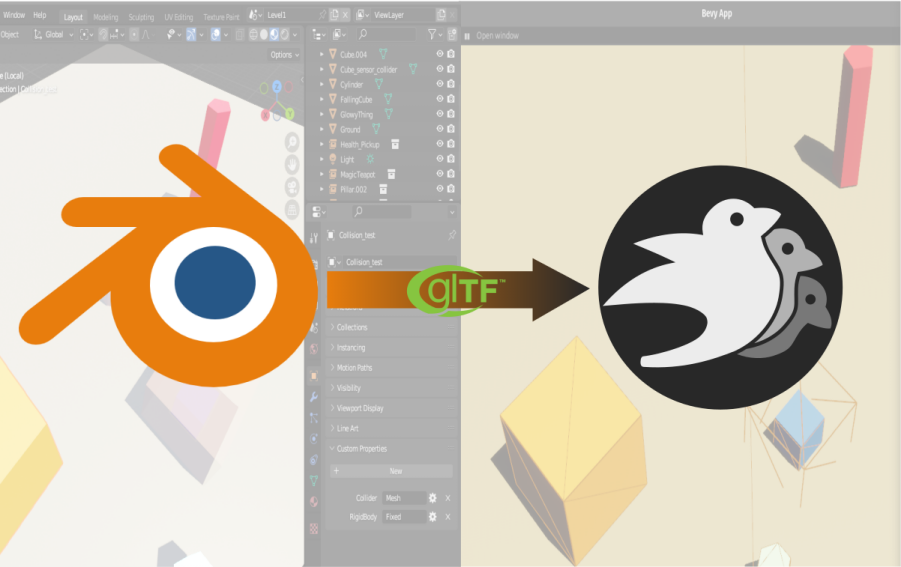* not using / tracking gltf files anymore (should avoid issues with scenes vs gltf files) * restructured accordingly * closes #102 * closes #111 |
||
|---|---|---|
| .github/workflows | ||
| crates | ||
| docs | ||
| examples | ||
| testing/bevy_registry_export/basic | ||
| tools | ||
| .gitignore | ||
| Cargo.toml | ||
| FUNDING.yml | ||
| LICENSE_APACHE.md | ||
| LICENSE_MIT.md | ||
| LICENSE.md | ||
| README-workflow-classic.md | ||
| README-workflow-ui.md | ||
| README.md | ||
| rust-toolchain.toml | ||
Blender_bevy_components_workflow
Crates & tools for adding components from gltf files in the Bevy game engine.
It enables minimalistic Blender (gltf) centric workflow for Bevy, ie defining entites & their components inside Blender using Blender's objects custom properties. Aka "Blender as editor for Bevy"
It also allows you to setup 'blueprints' in Blender by using collections (the recomended way to go most of the time), or directly on single use objects .
Features
- Useful if you want to use Blender (or any editor allowing to export gltf with configurable gltf_extras) as your Editor
- define Bevy components as custom properties in Blender (some visually , some using RON, though an older JSON version is also available)
- no plugin or extra tools needed in Blender (but I provide a little Blender add-on to auto-export to gltf on save (and more !) if you want !)
- now also with a nice UI tool to add & edit Bevy components in Blender
- define components in Blender Collections & override any of them in your collection instances if you want
- ability to automatically turn your Blender collections into gltf Blueprints for reuse
- minimal setup & code, you can have something basic running fast
- minimal dependencies: Bevy, Serde & Ron only !
- opensource
Crates
-
bevy_gltf_components This crate allows you to define components direclty inside gltf files and instanciate/inject the components on the Bevy side.
There is a video tutorial/explanation if you want, or you can read the crate docs. The examples for the crate are here
-
bevy_gltf_blueprints This crate adds the ability to define Blueprints/Prefabs for Bevy inside gltf files and spawn them in Bevy. With the ability to override and add components when spawning, efficient "level" loading etc
There is a video tutorial/explanation for this one too, or you can read the crate docs The examples for the crate are here
Note: this is the recomended crate to use and uses
bevy_gltf_componentsunder the hood -
bevy_gltf_save_load This crate adds the ability to save & load your game state in a relatively simple way, by leveraging the blueprint functionality of bevy_gltf_blueprints to only save a minimal subset of dynamic data, seperating dynamic & static parts of levels etc. The examples for the crate are here
Note: this uses
bevy_gltf_blueprintsunder the hood -
bevy_registry_export This crate adds the ability to export your project's Bevy registry to json, in order to be able to generate custom component UIs on the Blender side in the Blender bevy_components add-on
Tools
Blender: gltf_auto_export
- for convenience I also added a Blender addon that automatically exports your level/world from Blender to gltf whenever you save your Blend file
- it also supports automatical exports of collections as Gltf blueprints & more !
Please read the README of the add-on for installation & use instructions
Blender: bevy_components
- an add-on for Blender to allow easilly adding & editing Bevy components , using automatically generated UIs for each component
Please read the README of the add-on for installation & use instructions
Examples
you can find all examples, by crate as seperate crates for clearer dependencies in here
-
- basic use of
bevy_gltf_componentsonly, to spawn entities with components defined inside gltf files
- basic use of
Workflow
The workflow goes as follows (once you got your Bevy code setup)
- create & register all your components you want to be able to set from the Blender side (this is basic Bevy, no specific work needed)
- then you have two options
Limitations / issues
- Some of
bevy_rapier/physics code / ways to define colliders could perhaps be done better/visually within Blender (currently it also goes via RON)
Future work
- I have a number of other tools/ code helpers that I have not yet included here, because they need cleanup/ might make this example too complex
Credits
- somebody I cannot recall helped me originally with the gltf loading tracker in the Bevy Discord, so thanks ! And if it was you, please let me know so I can give credit where credit is due :)
Contributors
Thanks to all the contributors helping out with this project ! Big kudos to you, contributions are always appreciated ! :)
License
This repo, all its code, contents & assets is Dual-licensed under either of
- Apache License, Version 2.0, (LICENSE-APACHE or https://www.apache.org/licenses/LICENSE-2.0)
- MIT license (LICENSE-MIT or https://opensource.org/licenses/MIT)



